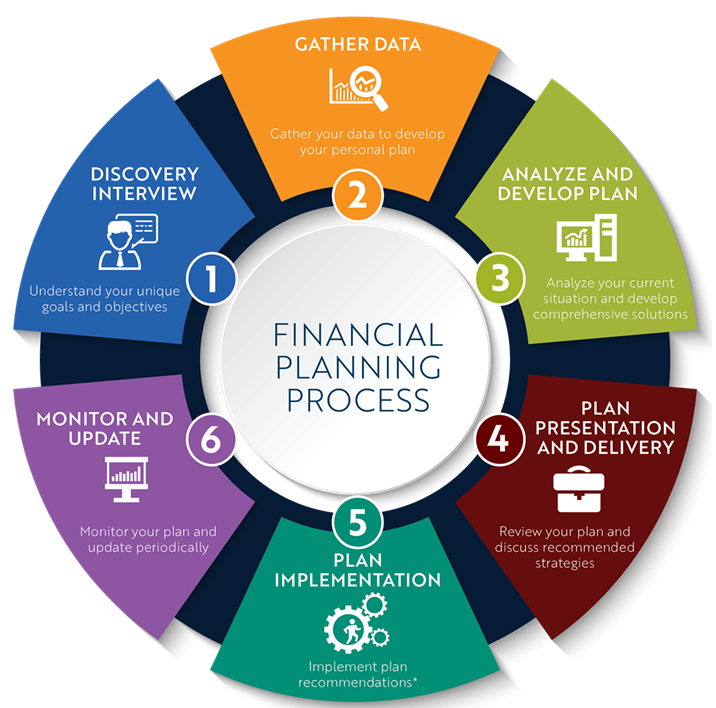services
Financial Planning Process
Includes Financial Planning Process, Different Types of Financial Planning Process, FAQ

What’s Financial Planning Process Service?
- Gather Data: Collect comprehensive financial information, including income, expenses, assets, liabilities, and investment details.
- Analyze and Develop Plan:Assess the gathered data to identify financial strengths, weaknesses, and opportunities.
- Plan Representation and Delivery:Present the financial plan to you in a clear and understandable manner.
- Plan Implementation:Put the approved financial plan into action by executing the outlined strategies.
- Monitor and Update: Regularly review and track the progress of the financial plan to ensure it remains on target.
Different Types of Financial Planning Process
- Managing individual finances to achieve personal goals, such as retirement, education, or purchasing a home.
- Includes: Budgeting, saving, investing, debt management, and retirement planning.
- Managing a company's finances to achieve business objectives, enhance profitability, and ensure long-term growth.
- Includes: Strategic financial planning, capital budgeting, cash flow management, and risk assessment.
- Preparing for financial security in retirement.
- Includes: Estimating retirement needs, creating retirement savings plans, and managing retirement accounts.
- Developing strategies to grow wealth through investments.
- Includes: Asset allocation, selecting investment vehicles, and managing investment portfolios.
- Managing and transferring assets according to an individual’s wishes after their death.
- Includes: Creating wills, trusts, and other estate documents, as well as planning for estate taxes and inheritance.
- Minimizing tax liabilities and optimizing tax strategies.
- Includes: Understanding tax implications, planning deductions and credits, and managing tax-efficient investments.
- Identifying and mitigating financial risks through insurance.
- Includes: Evaluating insurance needs for life, health, property, and liability, and selecting appropriate coverage.

Our Value-added Service
Our dedicated team of financial planning specialists is here to support you. With just one consultation, we can assess your financial goals and provide essential guidance for effective financial management.

Our fast delivery Service
At FAZ Financial Planning Services, we take pride in our efficient and comprehensive financial planning solutions. Our role is to gather all relevant financial information, conduct detailed assessments, and swiftly develop a tailored financial plan.

Never Miss a Deadline
Understanding the essential steps for managing your financial planning ensures you will never have to worry about missed opportunities or financial missteps. This approach helps you stay on track with your goals and maintain financial stability.
FAQ
Financial planning services help you organize your finances, set and achieve financial goals, and make informed decisions. They provide expert guidance to manage investments, reduce debt, and optimize financial strategies for better financial health.
Services usually include:
- Discovery Interview: Understanding your financial goals and current situation.
- Data Gathering: Collecting information on income, expenses, assets, and liabilities.
- Plan Development: Creating a tailored financial plan with strategies for budgeting, investing, and achieving goals.
- Plan Implementation: Executing the strategies outlined in the plan.
- Monitoring and Updating: Regularly reviewing and adjusting the plan as needed
Contact a financial planning service provider to schedule an initial consultation. They will discuss your financial goals, assess your current situation, and outline the steps involved in developing and implementing your financial plan.
You’ll need to provide documents related to your financial situation, including income statements, expense records, asset lists, liabilities, investment accounts, and any existing financial plans or statements.
Costs can vary based on the complexity of the plan and the provider’s fee structure. Common fee arrangements include hourly rates, flat fees, or a percentage of assets under management. It’s best to discuss fees upfront with your financial planner.
